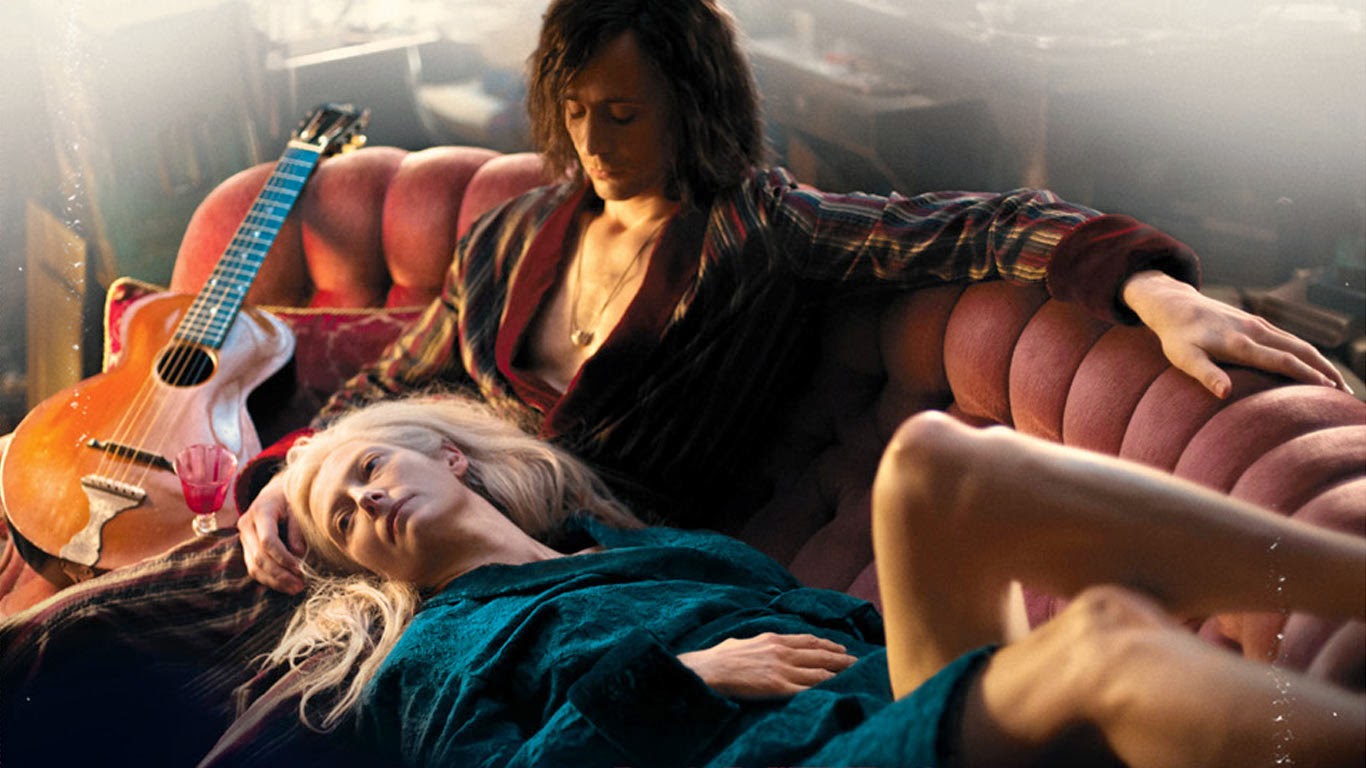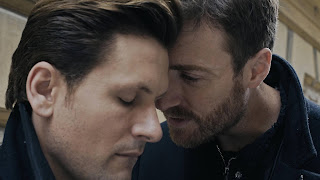Movie Review - Only Lovers Left Alive
Writer-director Jim Jarmusch submits this film into the vast vampire genre of movies. Tilda Swinton plays Eve and Tom Hiddleston plays Adam. The two are vampires in love who come back together after being apart. They've been alive for hundreds and hundreds of years. They go back to the time of Shakespeare, perhaps even further. There's no explanation why they split, how long they've been apart or who left whom. We assume Adam left, but who knows? Adam is depressed and possibly suicidal at the beginning and it makes sense. His journey to the end reverses his suicidal tendency but there's not enough about what's happening in his head to understand why.
Adam lives alone in an abandoned neighborhood in Detroit, which in reality is the whole city. Apparently, he has a bit of a reputation as a musician or guitarist, but he's reclusive. Yet, he has a human named Ian, played by Anton Yelchin (Fright Night and Star Trek). Ian is an assistant who runs errands for him and performs other tasks.
One of the errands is that Adam asks Ian to fetch him a wooden bullet. Ian doesn't know that Adam is a vampire or the true reason for it. When Eve arrives from Tangiers to visit, she discovers the gun and the wooden bullet. She realizes he has it to commit suicide. She tries to talk him out of it. She even dances with him in slow-motion. Yet, that doesn't seem like it's enough to dissuade him from killing himself.
Adam also seems to have a disdain for humanity. He calls them "zombies," which makes no sense. Adam and Eve both suggest that great accomplishments in art weren't accomplished by humans, despite humans getting the credit. The true accomplishments were by vampires like him. Adam also goes on a rant about how humans have polluted their bodies and the waters, so he harbors some misanthropy.
Except, as a vampire, he needs blood, specifically human blood. It's apparently not like Interview with a Vampire where Brad Pitt could drink animal's blood and be fine. Jarmusch establishes that as a rule. He also establishes other common vampire rules like the avoidance of sunlight and the sleeping in a darkened room during the day. Jarmusch also establishes that some vampires have certain powers. Adam has super speed. Eve can touch things and determine their age.
Yet, there's so much about this world and these two that Jarmusch doesn't explain. Adam has a ton of cash, for example, and Eve has credit cards, but how do they have all these funds? Jarmusch perhaps put thought behind those details, but his concerns seem more wrapped in exploring immortality in a less horrific and more meditative way than most vampire films.
Jarmusch seems also to want to say something about music and the music industry. The opening shot is that of a record player, which dissolves to individual, overhead shots of Eve and Adam that spin 360-degrees. The ending has the pair watching real-life, Lebanese singer Yasmine Hamdan. With concerns of his music being stolen, Adam delights in Yasmine, but does this give him hope? He seems resigned to death by the end, but it could be something else.
Both Adam and Eve get their blood through sterile and clinical methods. Adam purchases scientifically-sealed canisters of blood secretly from a lab doctor, played by Jeffrey Wright, at a hospital. Eve buys her blood, packaged in plastic, secretly and under the table from a dealer in Tangiers. Both could kill to get their blood, but they don't.
In fact, both seem to abhor killing humans, but I'm not sure why. It might not stem from moral reasons. It's likely from advancement in murder-investigation procedures and not being able to kill humans frequently and evade detection and prosecution.
Yet, they have no problem with turning people into vampires. The question is if the one and only time we see Adam and Eve moving to turn people into vampires is because they're hungry for blood in order to perpetuate themselves physically or perpetuate themselves in a metaphysical sense. I'm not sure, and that's why the film fails for me. Mia Wasikowska gives a great supporting performance though, as an annoying brat.
Two Stars out of Five.
Rated R for language and brief nudity.
Running Time: 2 hrs. and 2 mins.
Adam lives alone in an abandoned neighborhood in Detroit, which in reality is the whole city. Apparently, he has a bit of a reputation as a musician or guitarist, but he's reclusive. Yet, he has a human named Ian, played by Anton Yelchin (Fright Night and Star Trek). Ian is an assistant who runs errands for him and performs other tasks.
One of the errands is that Adam asks Ian to fetch him a wooden bullet. Ian doesn't know that Adam is a vampire or the true reason for it. When Eve arrives from Tangiers to visit, she discovers the gun and the wooden bullet. She realizes he has it to commit suicide. She tries to talk him out of it. She even dances with him in slow-motion. Yet, that doesn't seem like it's enough to dissuade him from killing himself.
Adam also seems to have a disdain for humanity. He calls them "zombies," which makes no sense. Adam and Eve both suggest that great accomplishments in art weren't accomplished by humans, despite humans getting the credit. The true accomplishments were by vampires like him. Adam also goes on a rant about how humans have polluted their bodies and the waters, so he harbors some misanthropy.
Except, as a vampire, he needs blood, specifically human blood. It's apparently not like Interview with a Vampire where Brad Pitt could drink animal's blood and be fine. Jarmusch establishes that as a rule. He also establishes other common vampire rules like the avoidance of sunlight and the sleeping in a darkened room during the day. Jarmusch also establishes that some vampires have certain powers. Adam has super speed. Eve can touch things and determine their age.
Yet, there's so much about this world and these two that Jarmusch doesn't explain. Adam has a ton of cash, for example, and Eve has credit cards, but how do they have all these funds? Jarmusch perhaps put thought behind those details, but his concerns seem more wrapped in exploring immortality in a less horrific and more meditative way than most vampire films.
Jarmusch seems also to want to say something about music and the music industry. The opening shot is that of a record player, which dissolves to individual, overhead shots of Eve and Adam that spin 360-degrees. The ending has the pair watching real-life, Lebanese singer Yasmine Hamdan. With concerns of his music being stolen, Adam delights in Yasmine, but does this give him hope? He seems resigned to death by the end, but it could be something else.
Both Adam and Eve get their blood through sterile and clinical methods. Adam purchases scientifically-sealed canisters of blood secretly from a lab doctor, played by Jeffrey Wright, at a hospital. Eve buys her blood, packaged in plastic, secretly and under the table from a dealer in Tangiers. Both could kill to get their blood, but they don't.
In fact, both seem to abhor killing humans, but I'm not sure why. It might not stem from moral reasons. It's likely from advancement in murder-investigation procedures and not being able to kill humans frequently and evade detection and prosecution.
Yet, they have no problem with turning people into vampires. The question is if the one and only time we see Adam and Eve moving to turn people into vampires is because they're hungry for blood in order to perpetuate themselves physically or perpetuate themselves in a metaphysical sense. I'm not sure, and that's why the film fails for me. Mia Wasikowska gives a great supporting performance though, as an annoying brat.
Two Stars out of Five.
Rated R for language and brief nudity.
Running Time: 2 hrs. and 2 mins.











Comments
Post a Comment